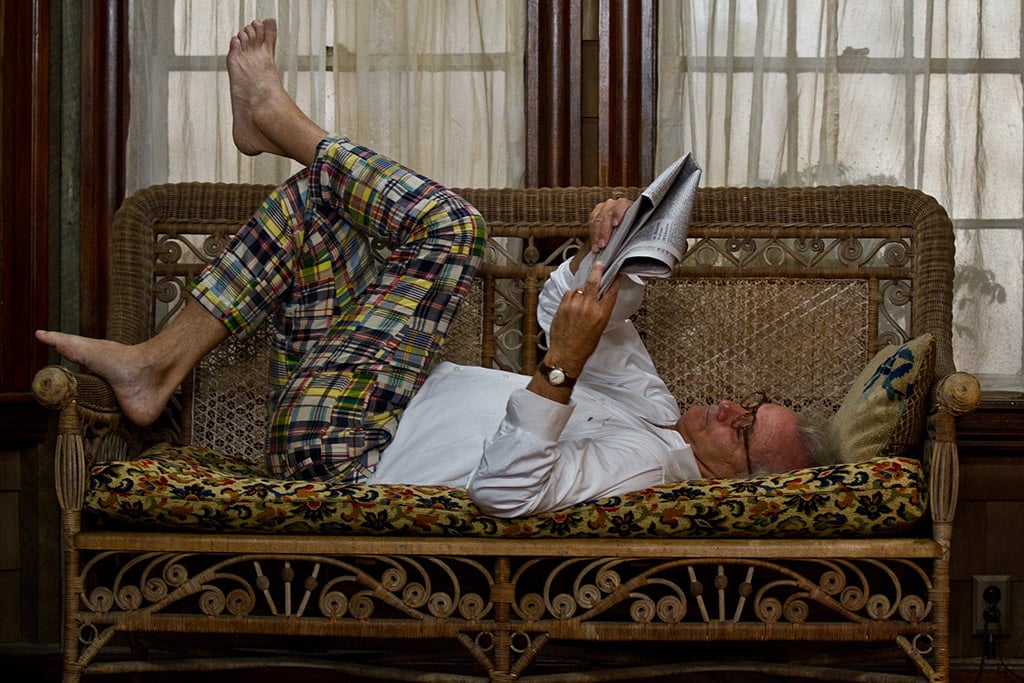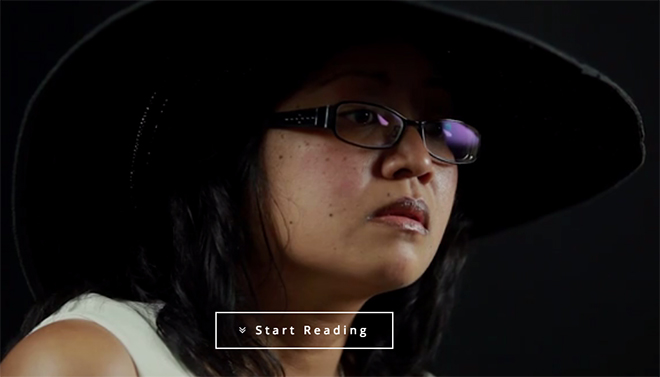Your Rainy Day Reading List Of Things Which Just Won The Pulitzer Prize
Outside is the worst. Stay in and learn some stuff.

Winter’s more passive-aggressive cousin Autumn is well and truly here, and outside is looking less and less desirable. If you live in Melbourne, you’ve most likely transitioned into boots and scarves; if you live in Sydney, half your house is probably submerged in ice water; and if you’re in Brisbane, it’s slightly too cold to be at the beach now.
Actually, maybe you should just get out of here, Brisbanians. Your presence will only going anger everyone else at this point.

If you do have the misfortune of being stuck shivering next to a heater or hiding inside from the “STORM OF THE CENTURY” right now, it’s not all bad news. First off: Netflix is still a thing which exists, and also the winners of the Pulitzer Prize were just announced.
You have a lot of excellent reading to catch up on.
In the creative categories, Anthony Doerr took out the award for fiction with his novel All The Light We Cannot See and Gregory Pardlo came out on top in poetry with his collection Digest. Stephen Adly Guirgis’ Broadway show Between Riverside and Crazy was recognised in the drama category, and the non-fiction winners included Elizabeth A. Fenn’s investigation into Native American life before European settlement, and David Kertzer’s revealing biography of Pope Pius XI and his little-known relationship with Mussolini.
If you have a copy of any of those works, by all means get stuck into them; but for everyone else that means a dreaded trip out to the bookstore. To help you avoid that, here’s a selection of the other more journalistic pieces which you can read right now in your gloriously warm bed.
No paywalls. No pants necessary. No problems.
–
‘Till Death Do Us Part’ – The Post And The Courier
Domestic violence rates have decreased by 64 percent nationally over the past 20 years in the US, but in South Carolina they’ve pretty much stayed the same. To draw attention to this incredibly important issue, put a face to it, and ask why nothing was being done, The Post and The Courier launched a seven-part series of in-depth investigations.
“More than 300 women were shot, stabbed, strangled, beaten, bludgeoned or burned to death over the past decade by men in South Carolina, dying at a rate of one every 12 days while the state does little to stem the carnage from domestic abuse,” the first instalment starts.
“More than three times as many women have died here at the hands of current or former lovers than the number of Palmetto State soldiers killed in the Iraq and Afghanistan wars combined.”
Of course, this issue is pertinent to those in Australia as well. While we’re starting to see politicians taking small steps forward on the matter, there hasn’t been any strong legislative action to stop violence against women and according to Destroy The Joint, 31 women have already been killed this year.
This series won the Pulitzer Prize for Public Service.
–
‘Counting Favor’ – Eric Lipton, The New York Times
You know a story is good when it has its own multimedia section in The New York Times.
This takedown of congressional leaders and the state attorneys general revealed a completely damning link between politicians and corporate interests, drawing attention to the money donated to specific leaders’ campaigns and the very real influence it had in legal disputes late last year.
Joe Hockey may have taken Fairfax to court for defamation when they suggested he was a “Treasurer For Sale,” but he would have been straight-up fired if the evidence looked anything like this. Case in point: here’s a letter from Oklahoma’s Attorney General that’s pretty much been written by energy company officials.
Sifting through it all is a very good way to act out House Of Cards fantasies without that pesky fear of being murdered.

This series won the Pulitzer Prize for Investigative Reporting.
–
‘Tax Runaways’ – Zachary R. Mider, Bloomberg
It took 25 (decent-sized) articles for this award-winning journalist to get the US public to understand how so many corporations are able to dodge taxes, and how it’s even legal.
It’s a tricky one, but it’s far from being boring. Obviously, I’m not going to attempt to do it here, but in the series Mider explains the tax loophole of “inversion,” who’s doing it, what the cost to the government is, and what they should do about it.
I’d say it was a slightly less-nauseating Wolf Of Wall Street, but it starts with video footage of a jokey operetta written by the lawyer who invented the technique being performed at a snooty Manhattan party in the ’90s. It’s pretty terrible.
This series won the Pulitzer Prize for Explanatory Reporting.
–
‘How TV’s Age Of Exploration Put Viewers In Control’ – Mary McNamara, LA Times
Of course, you don’t have to be pullin’ in scoops on big business to be worthy of a Pulitzer. Mary McNamara just won one for her “savvy criticism that uses shrewdness, humour and an insider’s view to show how both subtle and seismic shifts in the cultural landscape affect television”. She’s nothing if not comprehensive:
“Here are a few things that did not exist in American television 10 years ago: Binge-watching; recapping; scripted series on networks devoted to old movies, science and history; zombies; streaming services; popular series that end just because the story is done; film-franchise adjacency; shows that begin as miniseries and then continue indefinitely; multiplatform viewing; two concurrent versions of Sherlock Holmes; A-list film directors; television shows devoted to talking about television shows; live tweeting; micro-audiences; immediate remakes of British series; any remakes of European series; European series; subtitles; cord-cutting; horrific violence; series in which the cast stays the same but the story changes; series in which the title stays the same but the story and cast change; really good computer graphics; comedies more dark than funny; amazing international locations; an overabundance of stories characterizing the many ways in which television has changed in the past 10 years.
“Here’s the most important thing that did not exist in the television universe 10 years ago: ownership.”

Wah-ut? That all sounds very relevant to this event we’re hosting next week. Please send the award c/o Junkee, thanks.
This writer won the Pulitzer Prize for Criticism.
–
‘Service Not Included’ – Kathleen Kingsbury, The Boston Globe
As fast food workers in the US demanded better living wages with a series of protests last year, Kathleen Kingsbury explored the issue on a personal level with those affected most. By talking to those who are seriously struggling, she effectively dispelled the myth that the service industry is just for teenagers.
“Hope Shaw [is a] 38-year-old single mother of three who is assistant manager at Dunkin’ Donuts on Boston Street. She, too, likes to serve. But her life is one of unrequited toil. She lives paycheck to paycheck. Her heating gas was shut off last winter for failure to pay; the electric bill for her Dorchester apartment is consistently three months overdue. She’s gone without health insurance for more than a year. ‘My rent is $1,100 a month,’ she says. ‘Every month I feel like I’m choosing between paying that or putting food on the table.'”
Love this @TFuchsStudio illo for @katiekings Pulitzer-winning series @GlobeOpinion @BostonGlobe pic.twitter.com/V2QKUmIAea
— Heather Hopp-Bruce (@H_HoppBruce) April 21, 2015
In this expansive series of well-researched opinion pieces, Kingsbury argued that McDonalds could easily pay their staff double what they currently receive by raising the price of a Big Mac just $1.
This series won the Pulitzer Prize for Editorial Writing.
–
‘Scenes From California’s Dust Bowl’ – Diana Marcum, LA Times
While California is perhaps best known for its beach culture and glamorous entertainment industry in Los Angeles, 80 percent of the state is in fact in extreme drought. Venturing into the Central Valley, LA Times reporter Diana Marcum explored life in the enormous agriculture region which has been stricken the worst.
Travelling through six communities, the series gives us an intimate glimpse at what life is like for the farmers who are facing constant struggle. Through her sprawling narratives you meet a father keeping face for his family, a 91-year-old stubbornly sticking to his land, and a grandmother battling cancer searching the streets for water to name a few.
As if that wasn’t already upsetting enough, there are also photos:
I also want to recognize @chavismophoto, Dorothea Lange to @DianaMarcum's Steinbeck. Best photos of the year. pic.twitter.com/ZZdDBIAyNT
— kari howard (@karihow) April 20, 2015
This series won the Pulitzer Prize for Feature Writing.
–
See the full list of Pulitzer Prize winners here.
